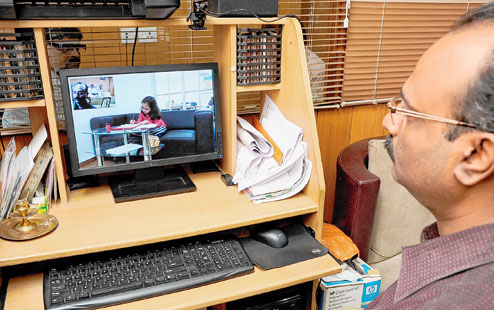 |
| Computer teacher Joydeep Mitra uses a webcam and a Skype connection to keep watch from a school in Dankuni while Class III student Sanchari Biswas writes her exam sitting in a living room in Bern, Switzerland. Picture by Sanat Kr Sinha |
A 360-degree webcam view has bridged a cross-continental divide of distance and trust between examinee and invigilator.
Sanchari Biswas, a Class III student of Methodist School in Dankuni who is temporarily based in the Swiss city of Bern, wrote the first paper of her annual assessment on February 25 seated in front of a webcam while an invigilator kept watch 4,500 miles away.
Skype is a popular tool for friends, lovers, children, parents and grandparents to stay in touch across continents, but Sanchari sitting for an English test in a Bern living room and a teacher watching over her sitting in her principal’s room in Dankuni isn’t something that happens every day.
“Around two months ago, Sanchari’s father requested us to allow her to write her papers from Bern. We agreed to it, saying the answer sheets should be scanned live in front of the webcam and emailed to us,” said Norton Emmanuel, the principal and secretary of the school.
Methodist School, which did what many educational institutions wouldn’t do for various reasons, did a dummy run of the long-distance test over webcam two weeks before the start of the real exam.
“Sanchari’s family provided us with a 360-degree view to make sure that we didn’t doubt someone was prompting her from another part of the room or helping her through any other means,” said computer teacher Joydeep Mitra, who played invigilator on the first day.
Given the separate time zones — Switzerland is four-and-a-half hours behind India — Sanchari has been getting up early on each exam day so that she can put pen to paper at the stroke of 6am local time. Her last paper is on March 9.
Sanchari might not have been able to continue as a student of Methodist School, let alone write an exam supervised over a webcam, had the authorities not made an exception for her.
Her father Subir Kumar Biswas is an IT professional sent by his company to Switzerland in February 2012. Since it was to be a long stint, Sanchari and her mother decided to accompany him if the school agreed to retain her as a student for the year without her attending classes.
“She did miss the regular class notes but I was in touch with her teachers and friends to know what was being taught and ensure that she kept pace,” mother Nilima told Metro from Bern.
Sanchari was supposed to return to Calcutta to write her term-end papers but Subir’s work permit being on extension, the family could not make it. The family was in town in October to attend the funeral of Sanchari’s grandfather and a second visit for her exams would have been taxing, father Subir said.
The Class III girl is lucky her school understood.
St. James’ School allows a student to apply for long leave to go abroad but sitting for the year’s final assessment is mandatory. “Once the student comes back, he has to write the final exam before being promoted to the next class. But the child has to take the test,” principal Terence Ireland said.
A Class II student at St. James’ was recently granted long leave after his father was transferred to New Jersey in the US. At Modern High, a middle-school student was given permission to go to Washington DC for a year and stay with her father, who was on assignment as a guest lecturer in a university there.
The Heritage School too allows students going abroad with their parents for “legitimate reasons” to retain their seats for a mutually agreed period and temporarily enrol in a school in the city or town where they are staying. On their return, which as a rule can’t be more than a year, it accepts certificates issued by the schools where they studied during that period.
“We are strict about ascertaining whether the application for long leave to go abroad is justified. When they come back, we accept the certificate issued to the child by the school where she temporarily studied and it is not mandatory for her to write another exam here. But such leave is only for travel abroad,” Devi Kar, the director of Modern High, said.
While some schools bend the rules to ensure students don’t suffer because of the nature of their parents’ jobs — IT companies routinely send employees abroad for projects — La Martiniere for Boys does not entertain any such request.
In the past three years, the south Calcutta institution has turned down around eight applications for long leave to travel abroad. “Most of these applicants are children of people employed in the IT sector and they go for six months, which extends to a year or two years and we don’t know whether they will come back. So we do not follow the policy of keeping a seat reserved for them,” principal Sunirmal Chakravarthi said.
La Martiniere’s argument is that a seat cannot be blocked for a student who isn’t present in the city and denied to one who stays here and fulfils the criteria for admission.
“They are ready to pay the fee for the entire period but somebody else could make use of that seat. Our first obligation is towards the people of the city,” Chakravarthi said.
The only concession that La Martiniere makes is that on returning to the city, a student is free to apply for admission again and he has “a headstart” because the authorities already know his background. But admission is subject to a vacancy.
For Sanchari, the clincher was that she is “one of our bright students”, principal Emmanuel said.
The nine-year-old did go to a school in Bern the past year but only to learn German.
Is webcam exam the way forward? Tell ttmetro@abpmail.com










